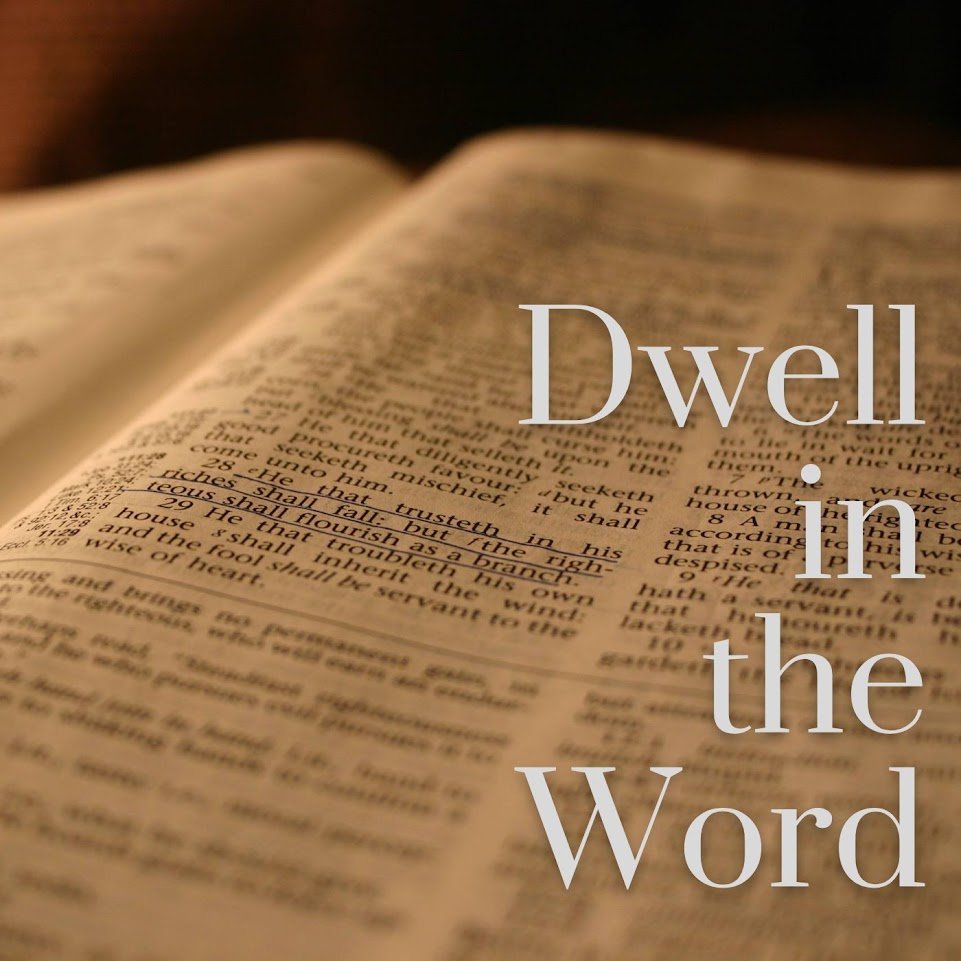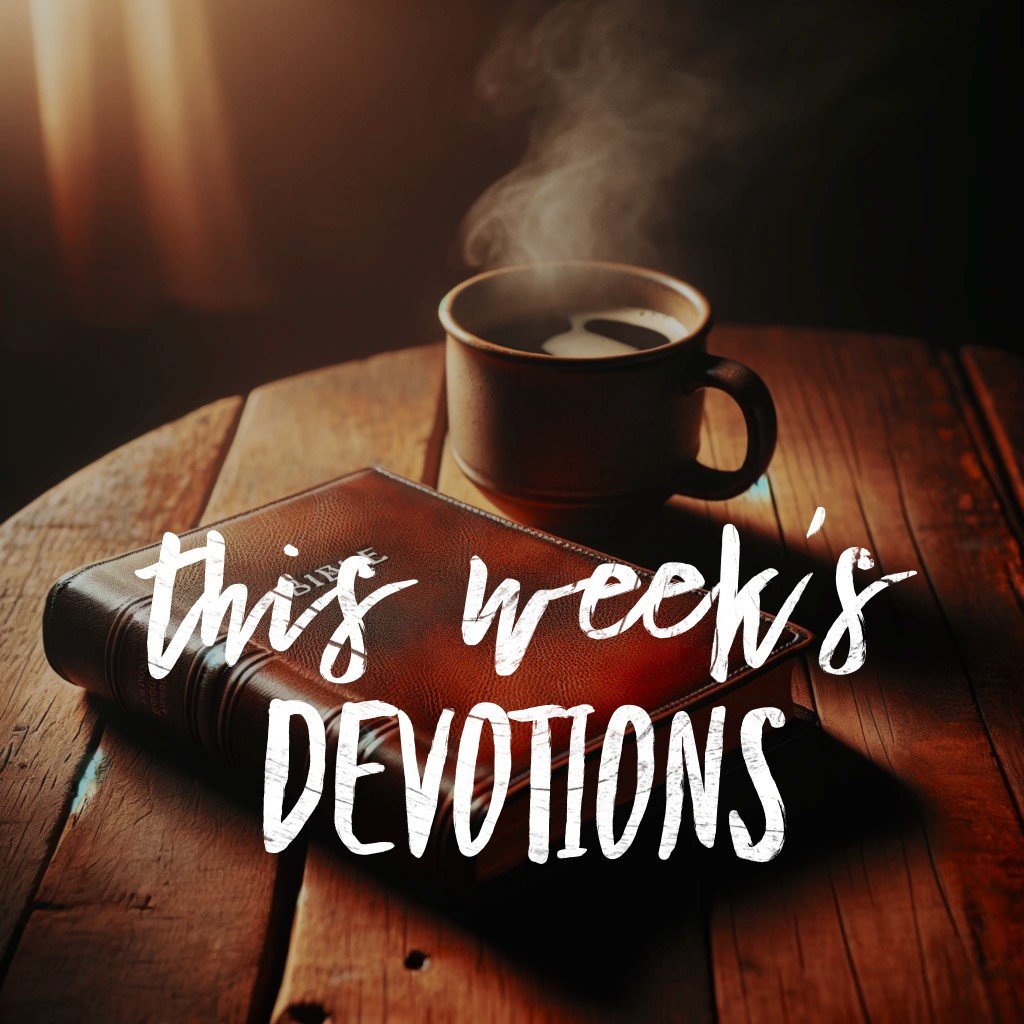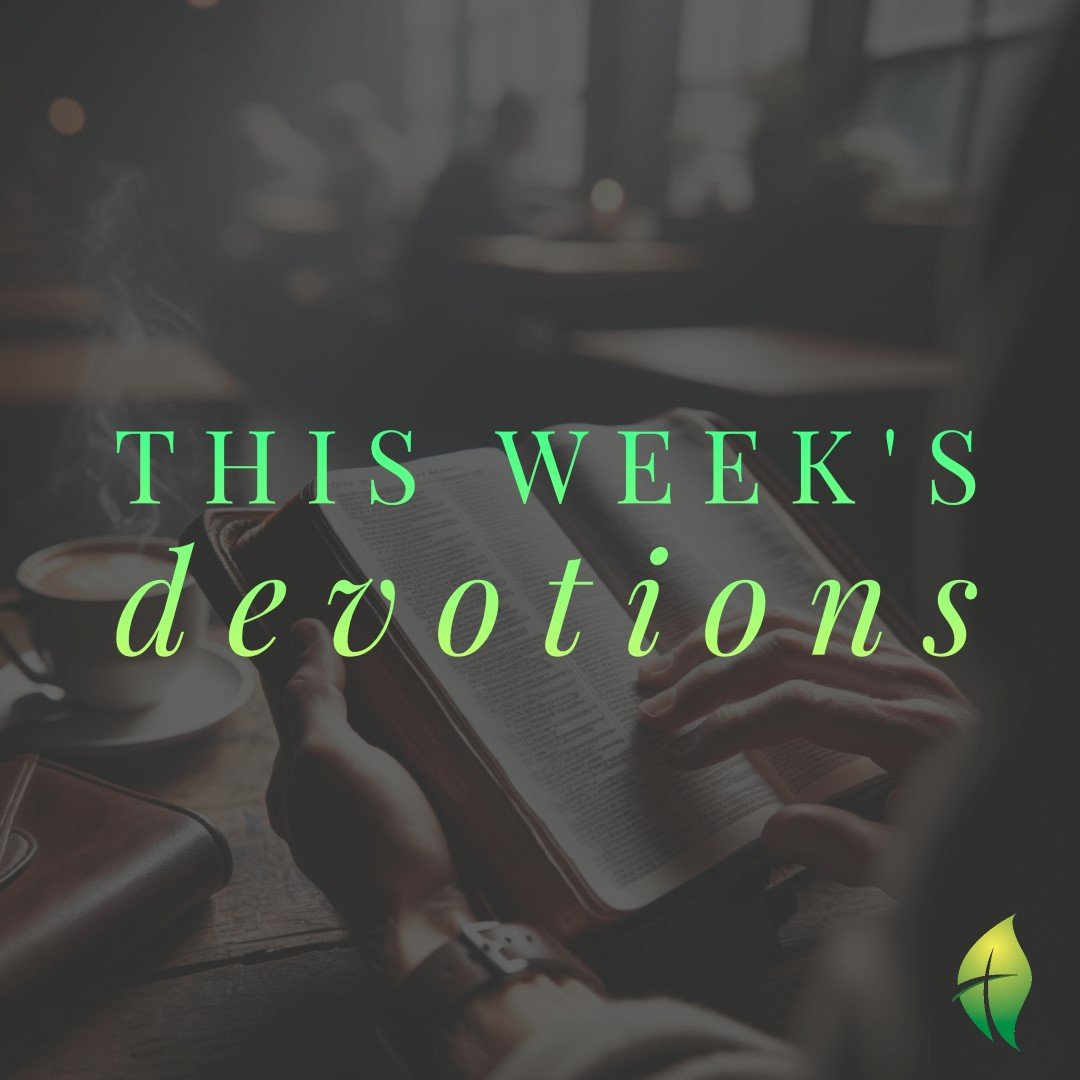
Devotions: Immovable
Day 1: Reflecting on Righteousness
Scripture Reading: James 1:22-25
Reflection: True righteousness isn't just about external adherence to the law; it's about being a doer of the Word. How does the mirror of the Word reflect your true character?
Prayer: Lord, help me to not only hear Your word but to act upon it, reflecting true righteousness in my daily life.

July 7 Sermon: Immovable
As you can imagine, I often receive a wide range of questions as a pastor. From practical concerns about ethics or the Christian life to deep theological inquiries. I get these types of questions on a somewhat regular basis. Among these, the most pivotal questions I receive often revolve around salvation. And more importantly, probably the better way to describe it would be assurance. How can I know that I'm saved? And, such questions echo a profound biblical inquiry, such as we find in Psalm 15 this morning, where David asks, who can sojourn in the Lord's tent, and who shall dwell on his holy hill?

Dwell in the Word: Psalm 21
We land in Psalm 21 today and we see an opening statement of praise. And it's important that we stop for a moment and we remember back to Psalm 20. That Psalm was a call for salvation. It started with, may the Lord answer you in the day of trouble and then ends with the prayer for Yahweh to save the King. And the final words are, may he answer us when we call. Psalm 21 then is a companion to that previous chapter of the Psalter. And the idea is that this is a song of praise in Thanksgiving that God has provided victory for the King.

Devotions: Folly’s Echo, Wisdom’s Call
Day 1: Understanding Our Depravity
Scripture Reading: Romans 3:9-12
Reflection: Romans reiterates the theme of universal sinfulness, a concept explored in Psalm 14. Reflect on how acknowledging our sinfulness without despairing is possible only through understanding Christ's work on the cross.
Prayer: Lord, help me see my sin clearly but through the lens of Your mercy and grace. Grant me the humility to confess and the courage to change.

June 30 Sermon: Folly’s Echo, Wisdom’s Call
Explore Psalm 14 as we navigate through themes of human depravity, the distinct lives of the righteous, and the profound promise of God's deliverance. Discover how these ancient truths can guide us in today's complex world. Tune in to find wisdom and encouragement for your spiritual journey.
Consider these questions as you listen:
1. How does recognizing our own depravity help us appreciate God's grace more deeply?
2. In what ways can you see the difference between the lives of the righteous and the ungodly in your own community?
3. What practical steps can you take this week to live out the truth that God is your refuge and deliverance in times of trouble?

Trusting God Over Chariots and Horses | Psalm 20 Devotional | Dwell in the Word
In this Dwell in the Word devotional, Pastor Mark reflects on Psalm 20 and its timeless message of trust. While the world may rely on earthly strength—chariots, horses, power structures—the people of God are called to trust in something far greater: the name of the Lord. David's words point us to an unshakeable hope, fulfilled ultimately in Christ, who triumphed over sin and death. Watch, reflect, and be reminded where your true confidence lies.

Dwell in the Word: Psalm 19
Here in Psalm 19 we see a few different phrases that you probably find to be familiar. And you know the kind of statements in the Psalms that I'm talking about here. You are reading through a passage and you come across some verses, and the words are something that is used often, say, in prayers or in worship, and your brain says to you, oh, that's where this phrase is found in the Psalms. In fact, when we got to the end of Psalm 19, you might have thought, hey, that's what Mark says at the end of the prayer for illumination each week. Well, several phrases here are memorable to us because they are powerful and they use language that really draws us in. This Psalm of David is filled with praise and prayer, and he starts out by speaking about the handiwork of God.

Devotions: When God Seems Silent
Day 1: The Legitimacy of Lament
Scripture Reading: Psalm 13:1-2; Psalm 42:9-11
Reflection: David's lament in Psalm 13 echoes the deep sorrow and confusion many of us feel during difficult times. He openly expresses his feelings of abandonment, showing us that it is okay to be honest with God about our struggles. Similarly, in Psalm 42, the psalmist cries out to God, expressing his soul’s turmoil. Both passages remind us that lament is a legitimate and important part of our faith journey.
Prayer: Lord, thank You for hearing our cries and understanding our pain. Help us to be honest with You about our struggles, trusting that You care deeply for us. Teach us to bring our laments to You, knowing You are a loving and compassionate Father. Amen.

June 23 Sermon: When God Seems Silent
We've all been in situations where we feel that we can't just say how we feel. Maybe it's a meeting at work or a discussion you're having with a friend, a spouse, or a parent. But we just feel that we can't say what we really feel in that moment. We have something that we feel deeply. We want to express it. But as it approaches our tongues, we stop. And we think it might be a better idea not to let it get past our lips. It probably isn't beneficial for us to put out there what we are thinking and feeling. Now, I'm not talking about a... quick, hot burst of emotion here. I'm talking about something that has been on our mind for quite a while. We've considered it.

Trusting God’s Strength | Psalm 18:33-50 Devotional | Dwell in the Word
As we have worked our way through Psalm 18, we've seen David speak of how God is his rock and his fortress and how God has rescued David even though he was in significant peril. The conflict that had such a deep impact on the life of David was King Saul pursuing him in jealousy. As we saw when we started this psalm, it's a psalm of praise to God for the deliverance that God gave him from this terrible situation. And as we close up this Psalm with verses 33 through 50, we're going to see a repetition of these ideas and we're going to see continued praise to God for the deliverance that he provides. When we wrapped up last time, David was making a statement by asking a question, Who is God but Yahweh and who is a rock except our God? The psalmist was making it very clear that God is in control and that God is faithful to keep the promises that he makes to his people.

Dwell in the Word: Psalm 18:20-32
As I said, this is our third episode in Psalm 18. First, we took a look at David praising God for his rescue with the first 3 verses of the psalm. And then we dug into verses 4 to 19, and we saw a vivid description of the peril that David was in, and we saw that only God could rescue David from this.
As we move on down to verse 20 now, the psalm transitions to contrasting the faithful 1 versus those who are not faithful.

Devotions: Enduring Words
Day 1: The Power of God’s Word
Scripture Reading: Proverbs 30:5-6
Reflection: Today’s reading reminds us of God's word's perfect truth and reliability. Unlike human words, which can be flawed and deceitful, God's words are pure and protect those who trust in Him. As we navigate a world filled with misinformation and deceit, let’s anchor ourselves in the certainty and safety of God’s promises.
Prayer: Heavenly Father, thank You for the truth and purity of Your word. Help me to rely on Your promises and teachings as my ultimate source of truth. Protect me from the temptation to add to or distort Your words. In Jesus’ name, Amen.

June 16 Sermon: Enduring Words
In our time, there are many things that we take for granted. I've used an example before, but I think about it regularly. We walk into a room, and we flip a switch, and we expect a light to come on. We just expect this. This is what we do. We reach into our pocket, and we can get information from all over the world, and we can communicate with pretty much anyone, anywhere. We just take this for granted. Technology has made our lives pretty simple compared to the way things were in times past. And really, I think we would all agree, it's truly a blessing that we don't have to labor over things at all that once were of a great concern for those who came before us. And arguably, one of the things that we maybe take for granted the most is clean water. In times past, finding good, drinkable water was the most important thing for us. It was difficult.

Dwell in the Word: Psalm 18:4-19
We continue through Psalm 18 and what we read from verses 4 through 19 and what we see emphasized to us and what we read is the way in which David describes the desperate state of affairs that he's in. This is strong language that we see here. The opening of Psalm 18 used great imagery of fortresses and strongholds, and David told us that he was saved from his enemies, but as we continue, he paints a picture of how desperate that situation was.

Finding Unshakeable Strength in Dangerous Times | Psalm 18:1-3 Devotional | Dwell in the Word
Welcome to Dwell in the Word devotionals. Pastor Mark reflects on Psalm 18:1-3, reminding us how David trusted in God's strength as his refuge and fortress. Though David faced relentless pursuit and danger, his confidence was never in himself—it was firmly placed in the Lord. This passage invites us to find that same unshakeable security in God, who delivers His people and points us to salvation in Christ. Watch, reflect, and be encouraged by God's steadfast protection.

Devotions: Above the Storm
Day 1: Trusting in God’s Refuge
Scripture Reading: Psalm 46:1-3
Reflection: Today's passage from Psalm 46 reminds us of God's unshakeable presence as our refuge and strength, an ever-present help in trouble. Like the psalmist in Psalm 11, we are encouraged to trust in God’s protection when everything around us seems chaotic. Despite the earth giving way or mountains falling into the heart of the sea, our confidence remains firm in the Lord, who is our sanctuary.
Prayer: Lord, in times of turmoil and uncertainty, help me to remember that You are my refuge and strength. When fears assail me and the ground shakes, let my heart cling to You, the unmovable rock of my salvation. Amen.

June 9 Sermon: Above the Storm
A few weeks back, I mentioned the importance of finding a good shelter in a storm. And how, when we experience a storm, we find ourselves running to the most secure location that we can find. And regardless of how strong a storm is, we are going to always choose something substantial over, say, a pup tent. When we see the storm clouds form, we look for something to get under. We look for refuge. Now, I recently learned that this is not something that eagles do. They don't look for something to get under. Under, as we would, instead of seeking shelter, like many birds and like we would, eagles actually use the winds of the approaching storm to gain higher altitude. So they position their wings in such a way that the wind moves them above the storm.

Dwell in the Word: Psalm 17
Here in Psalm 17, we find a prayer of David and we again see a psalm where the psalmist is in distress and this psalm is a psalm of lament. These tend to unfold in a very similar way when we come across them. These types of psalms generally open with crying out to God. This is then followed by the psalmist declaring innocence in that situation, the one that's causing this distress that is making them cry out to God

Dwell in the Word: Psalm 16
Psalm 16 starts out with a powerful prayer. The psalmist cries out asking for God to preserve him. This is a prayer that each of us has probably said at some point, we may not have used those exact words, but we have come to a point where we feel as though we can't make it on our own, and so we cry out to God. And we see why David is crying out to God in the circumstances that he is facing here in Psalm 16. It is because he understands that God is his refuge.

Devotions: From Questioning to Trusting
Day 1: The Reality of Evil and Suffering
Scripture Reading: Job 1:13-22
Reflection: Job’s response to overwhelming tragedy is a profound example of trust in God’s sovereignty, even when life seems chaotic and unjust. Like Psalm 10, Job’s story challenges us to acknowledge the reality of evil and suffering while holding fast to the belief that God remains just and good despite our circumstances.
Prayer: Heavenly Father, in the face of suffering and loss, help me to trust in Your sovereign care. Teach me to respond with faith, knowing that You are just and all-knowing, even when I do not understand the reasons for my trials. Amen.
